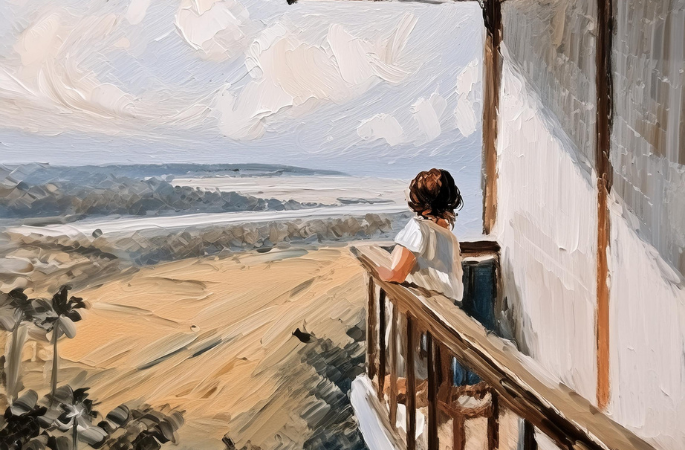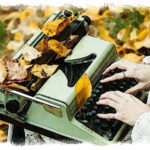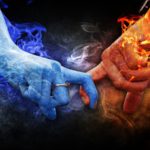I live in a little peach house on the western edge of the Navelim village in Goa. Down below, the dykes encircle the land, and the merios further break it up into neat squares for rice production. Further down, the placid river Sal flows. This is what the land looks like from the balcony outside my room. I spend my time watching the birds, the cows and the buffaloes under the changing colours of the fickle sky.
Nana, my paternal grandmother, tells me: I wasted so much time in my mother’s birth canal that I became deformed. My mother winces when she hears this! She hugs me soon after assuring me softly that children like me are special to God and born differently-abled. My father (when he has had too much feni) grumbles that God cannot be held responsible for the follies of humankind. “Those who suffer delays cause irrevocable damage.” He delivers his political riddles, singing in his baritone toddy tapper’s voice: “It was the Big-Vijay who back-stabbed his own Legion and delayed his own Luminiso in the Victory Canal. Little-Vijay lost no time in racing to Man-of-the-Hour, joining hands so that he could claim the ruling baton. It is because of this delay that God punished us: the wrong party came to power: he unleashed the endemic pandemic.”
My mother rushes to cover my ears at such times, saying, “Don’t you listen to his political parables and riddles. It is the feni talking.” “Antonio I will break that bottle over your head!” she says, showing a threatening finger. I simper at such moments, but frankly, his feni parables and riddles are okay with me! The neighbourhood children call me longddo! Yes, I drag my lower body. I was born paraplegic with a spinal injury. I felt hurt in the beginning, but now it is okay. My father loves me, I know, but it made him sad to see that I had a broken body and a face not under my control.
My great-grandfather Antonio Fernandes was the first to sail in our family of daily wage labourers and toddy-tappers. But he sailed only three times, each a long voyage of two years. “The second trip, he always remembered,” said my Nana, who was six years old when he returned from his last voyage, troubled by a tumour that killed him in a few months. He could not change the house ‘from thatch to tile’, but left behind three girls. The six-month-old baby and the two-year-old were sold into adoption in the month that he died. Only Nana remained.
My Nana remembered the stories her father had told her of Hiroshima and Nagasaki, where he had sailed on his first trip. He was a deckhand on an American cruise line, The Great Gatsby. American tourists sailed in large numbers to see Hiroshima and Nagasaki after the dropping of the atom bombs. Death, stone and rubble were everywhere. Hospitals were overflowing with bodies and body parts. Children ran on the streets with their skins ruptured. “It was inferno on earth!” he had said. Nana narrated it all, grinding her single front tooth while she massaged coconut oil into her calloused feet.
“The American tourists had come in hordes to see what ‘Fat Man’ and ‘Little Boy’ had done!” Nana’s open mouth revealed her sole treasure as she massaged her feet with pressure.
“Fat Man and Little Boy?”
“Yes. These were the secret names for the atom bombs Americans had dropped over Hiroshima and Nagasaki,” Nana replied.
Nana Josepha was named after Joseph Stalin, the tough Russian leader. The woman attending to Nana’s mother had asked him what he would like to name the girl child. “Name her Josepha,” he had replied in a telegram. Josepha Nana married a sailor, my grandfather Alarico Vaz, who gave her a tile roof and three sons before he retired. He was a tiatrist (an actor in the local tiatro) and the stage was his first love, where he played women’s roles. He was rarely home whenever he returned from a trip. Josepha Nana and her mother brought up the three boys. My father, Antonio, the eldest, married a girl of Nana’s choice from the village. He wanted to be a tiatrist like his dad but clever Nana did not want a repeat of her life. So she shackled him to an older girl. She gave the girl charge and asked her to rebuild the house. There is not much love lost between my father and mother.
Stella, my mother, took charge, broke down the old house and built a single-storeyed house. The old house was built on church land, so it became ours under the new law that gave land to the tenants and tillers. My mother decided there were many yellow houses in the vicinity. Also, purple, bright pink, and green had many repetitions. Peach it had to be! It reminded her of her favourite ice cream flavour, which she had at Jalateria Penguim. The three brothers, Nana and my mother, lived in the peach house till I was born in 2012. Some years later, my uncle Christev married Ana, his church-school sweetheart.
One day in March 2020, Nana came home from the market all flushed and feverish. The scare of an epidemic in China, which had spread to Europe, killing people ‘like fleas’, had begun to do the rounds at Christmas the previous year. The TV news showed pictures of people rolling on the streets, begging God for forgiveness. Coffins piled up in church halls, and weddings were getting cancelled. The Church was shut, and so were the schools. The undertaker had stopped ringing the belfry bell. The markets were open only for limited hours in the morning. My mother cautioned Nana to wear a mask when she sat in the market to sell homemade pork sausages.
“Wash your hands and stay aloof from people!”
“Take care Maie, you have weak lungs because of your asthma!”
“You will bring the disease home and infect all of us.”
But Nana laughed her hoarse laugh and ground her front tooth mockingly, saying that even the devil would be afraid to admit her, so why would an epidemic claim her? Unmasked, she went to sell pork sausages!
In a week’s time after admission to the Covid Hospital, she was dead. The coffin came sealed, carried by space-suited men. They took her to the graveyard from the hospital. This was just the beginning of our troubles. Mother and Uncle Christev buried tons of sausages, afraid they may have trapped the virus.
Uncle Christev was laid off for a long time after the first lockdown! This upset him, for he was saving money to build a house. When the vaccine was made available, there was confusion at home about whether to take it, but my uncle Christev was the first to take the jab. He celebrated the occasion, bringing home two-quarters of Old Monk rum, which he and my youngest uncle, Alarico, drank up that evening on the portico. The very next day, Uncle Christev was running a high fever and had to be hospitalised. He could not move the right side of his body, which had begun to swell. In five days, he was gone. The body was incinerated. The doctors treating him at the Covid Hospital said that the quarter of rum had killed him as it had reacted with the vaccine. In a few months, my mother and aunt Ana began to fight.
“You killed Christev!” I heard my mother shout.
“You did not do much better than giving birth to that cretin,” my aunt yelled back.
Aunt Ana left for good, taking with her the savings uncle Christev had put aside to build a house. Uncle Alarico lost his sailing job, too. Nana was gone. Ana had left. My father was away at sea, and the anxiety over his well-being was killing my mother. Alarico uncle began to drink. The peach house had become a bleak house. We spent time silently and going about our own lives.
“The pandemic broke our family and took my job,” Uncle Alarico used to say as he broke down into loud sobs in the balcao (front balcony) of our house ablaze with colour from the crotons my mother had lovingly nurtured.
My mother isolated me on the balcony. With two Covid deaths in the family, people have stopped visiting. I began to concentrate on greenery in the field. It has been a year of unseasonal rain and thunderstorms. I watch the thunder crack over the distant hills till well into December. The days and nights are restored to normalcy, and the sun begins to shine after mid-December. The winter birds have arrived in a wider variety and large numbers, too. From my perch at the peach house, I can see the eagles sunning themselves early in the morning, sitting on the tree that has shed its leaves for winter. They look like big strange fruit, ready to fall. They encircle the pond before they fly away one by one, trying perhaps to spot water hens which frequent the pond.
I spend more time on the balcony now. Mother says that I am lucky I do not have to wear a mask and can drink in all the fresh air of the field. I watch the winter birds, giving them names to pass my time. The regular little egrets ride placidly on the cattle, pecking at lice from time to time. I saw a pair of painted storks feeding in the grass, and the next day two greater adjutant storks were striding in the area near the pond. I pointed them to my mother, who gasped and said she had not seen them since childhood. “They come from Assam in the northeast,” she said; they build nests high up on the top branches of trees.
There was nothing else to do, so my mother began to join me in bird watching. She ordered a pair of binoculars from the internet through a neighbour. We sat from dawn to dusk watching the birds. “Awois (O goodness)! Look at that darter,” mother pointed out excitedly to a snake-like bird in the field just beyond the dykes. She would bring up her rice to clean and the wheat flour for kneading. Uncle Alarico rarely came home for meals. People bring him home from wherever he has fallen, sozzled with liquor. My mother curses the government policy of selling cheap liquor to attract tourists from ‘dry’ states. “Destroying our youth before our very eyes and even the Padres do nothing about it!” She massages fistfuls of sea salt into his heels so he can wake up from his stupor. A doctor in the neighbourhood recommends Alcoholics Anonymous. She calls them up. They pick him up and admit him to a detox home. Now, it is just mother and me in the peach house.
My father was still away at sea. My mother was upset after a phone call one morning informing her that my father had jumped ship off the coast of Mexico. “What does jumping ship mean?” I ask mother.
“Means he has gone missing!” She replies coldly. That evening, she lights two packets of white candles at the Cross Shrine on the road outside Peach House. It’s an old Cross where they recite the rosary and prayers during Lent. I watch from the window as some of her friends wearing masks console her. She was crying, and I cried. They chanted a rosary before she returned and brought up my dinner. She nibbled at the sannas (rice cakes) and the pickled pork she had made in the morning. There were tear trails on her cheeks when she got up to clear the melamine plates. It was drizzling outside, and the occasional mosquito hummed as it flew around.
She began to light two candles every day at the shrine. Her friend Auta took her to a local doctor who prescribed tablets for blood pressure and daily outdoor exercise. She began her morning walks in the field.
Some of the boys, shackled by the homestay imposed by COVID-19 restrictions, drink by the edge of the road at night. We can hear their scooters futfutting in the stillness. Their laughter melts into the rattling sound of rakes pulling by the Gudi crossing through Margao railway station.
The following day, on her short walk, my mother sees the green and honey-brown shards speckled with the remains of chicken shwarma like a violence-laden doily. She returns home in a bad mood and fires the poder (baker’s boy) and Cajetan, the milkman, as they do the day’s deliveries by the gate. “Accusing us without reason,” they both retort. “We earn 200 rupees a day. Can we afford to blow it up on a beer or two? It’s them, the sailor boys, who return with their pockets bursting with the dollars!”
Two black cormorants are seen flying, swimming or standing on the short stakes in the water. The bright light of the morning sun shines on them as they stand still, drying their wingpits. A small flock of greater egrets have arrived and hangs around in meditative poses. They fly to the very tree where the eagles once perched and roost there all evening. Three black and white pariah dogs start camping here, chasing each other in friendly runs across the field. I give my full attention to the new occupants, the greater egrets, dogs and cormorants.
One day, my mother comes home agitated, carrying something in her hands. It’s a greater egret with an injured wing chased by the dogs and rough-handled by them. She lays it on the table and picks out shards of beer bottles from its wing. Later, she and Auta took it to Dr Nikhil’s home in Benaulim. The veterinarian gives it a few stitches. My mother feeds it grains. She sends one of the boys to catch grasshoppers. I make the egret snug in a box beside my bed for the night. I touch it occasionally. By morning, there is a bond between us, two wounded birds unable to fly.
It is a good fifteen days before the egret, whom I have named Angel, can hop around and then be airlifted from the ground to the parapet of the balcony. It does small sorties and comes back to the balcony. Last night, my father called me and assured me he would put money into my mother’s account, but he said nothing more.
My uncle Alarico returns and works at the fair price shop. He has stopped drinking, and the three of us are planning my tenth birthday. Angel is still with us. She flies down briefly during the day to feed and hang around. The four greater egrets have flown. Several curfews have been lifted. The church bells ring. The school buses trundle past, and people hug and do not wear masks.
My mother decides to repaint the house in a new colour, blue. But in a day, she does a rethink. Peach will now bring us joy, she says as I smile, nodding my head with Angel beside me.



